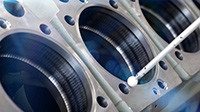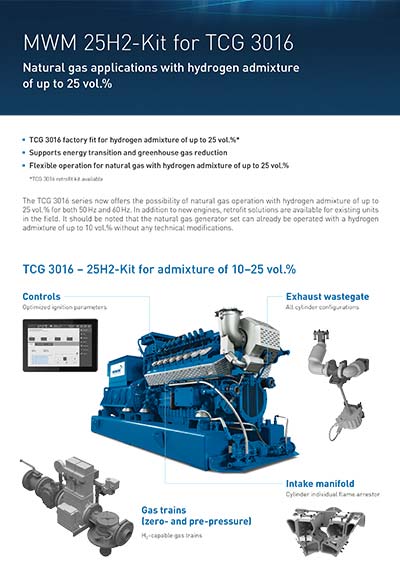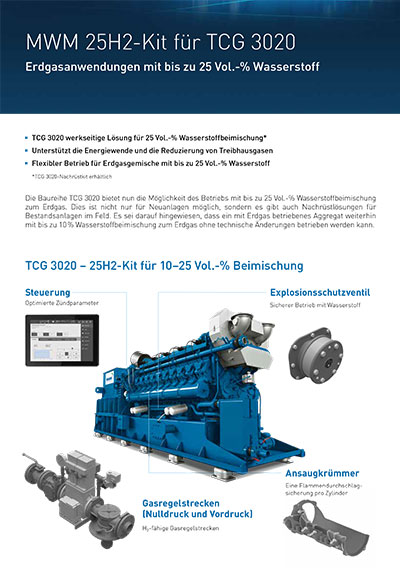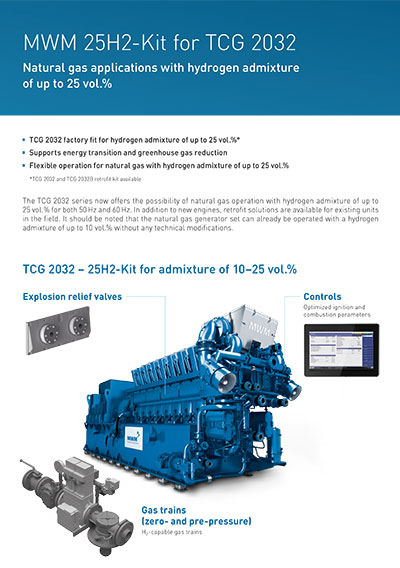MWM Hydrogen Power
Hydrogen as Climate-Friendly Alternative to Fossil Energy Sources
For the energy transition and climate protection, hydrogen (H2) is one of the key instruments to effectively reduce emissions from energy generation. Where produced in a climate-friendly way, the versatile fuel is a compelling, sustainable, and efficient alternative to fossil energy sources such as coal, oil, and natural gas. The European Union intends to achieve climate neutrality by 2050. For this, Europe’s carbon emissions from energy generation need to be reduced significantly. To achieve the defined climate goals, the energy consumption, too, must be brought down, e.g. via flex operation of cogeneration power plants. New laws and regulations including the 44th Federal Immission Control Ordinance (44th BImSchV) determine stricter emission limits for plants with firing systems, gas turbines, and combustion engines, which plant operators need to comply with. Also, they need to furnish evidence of their compliance with these laws and regulations. The National Hydrogen Strategy also provides for the speedy development of hydrogen technologies and assurance of international market availability for the production and use of hydrogen in order to make the amount of hydrogen required for the conversion of the respective application areas available as soon as possible.
Sustainably produced green hydrogen can used as a climate-friendly energy source for distributed power generation with gas engines, as fuel for vehicles, as raw material for chemical processes, and for long-term storage.
Green and Blue Hydrogen: Climate-Neutral Fuel and Energy Store
Compared to fossil fuels, the carbon emissions of sustainably produced hydrogen are much lower. About 96 percent of the hydrogen produced around the globe is produced from natural gas, oil, and coal. Distinction is made between green, blue, turquoise, and gray hydrogen.
Green hydrogen is produced via electrolysis using renewable energies, while blue hydrogen is produced using the steam reforming method in which the CO2 is captured and stored. At the bottom line, the production of both types of hydrogen is carbon-neutral.
Learn more about the synthesis and hydrogen as energy source: Gas Containing Hydrogen
Hydrogen Approved for Use as Fuel for MWM Gas Engines
Besides the benefit of lower emissions, the use of hydrogen also affects the efficiency, initial investments, fuel and maintenance costs, and the material quality of the piston engines. The properties of hydrogen give rise to a number of structural requirements that must be met and that are vital for products that support hydrogen. For example, this includes a wide range of flammability (enables lean mixtures), high autoignition temperature (similar to methane), low ignition energy (risk of premature ignition and flashback), and potential material incompatibilities (embrittlement of the steel). The developers of the MWM gas engines have mastered these challenges through ongoing research.
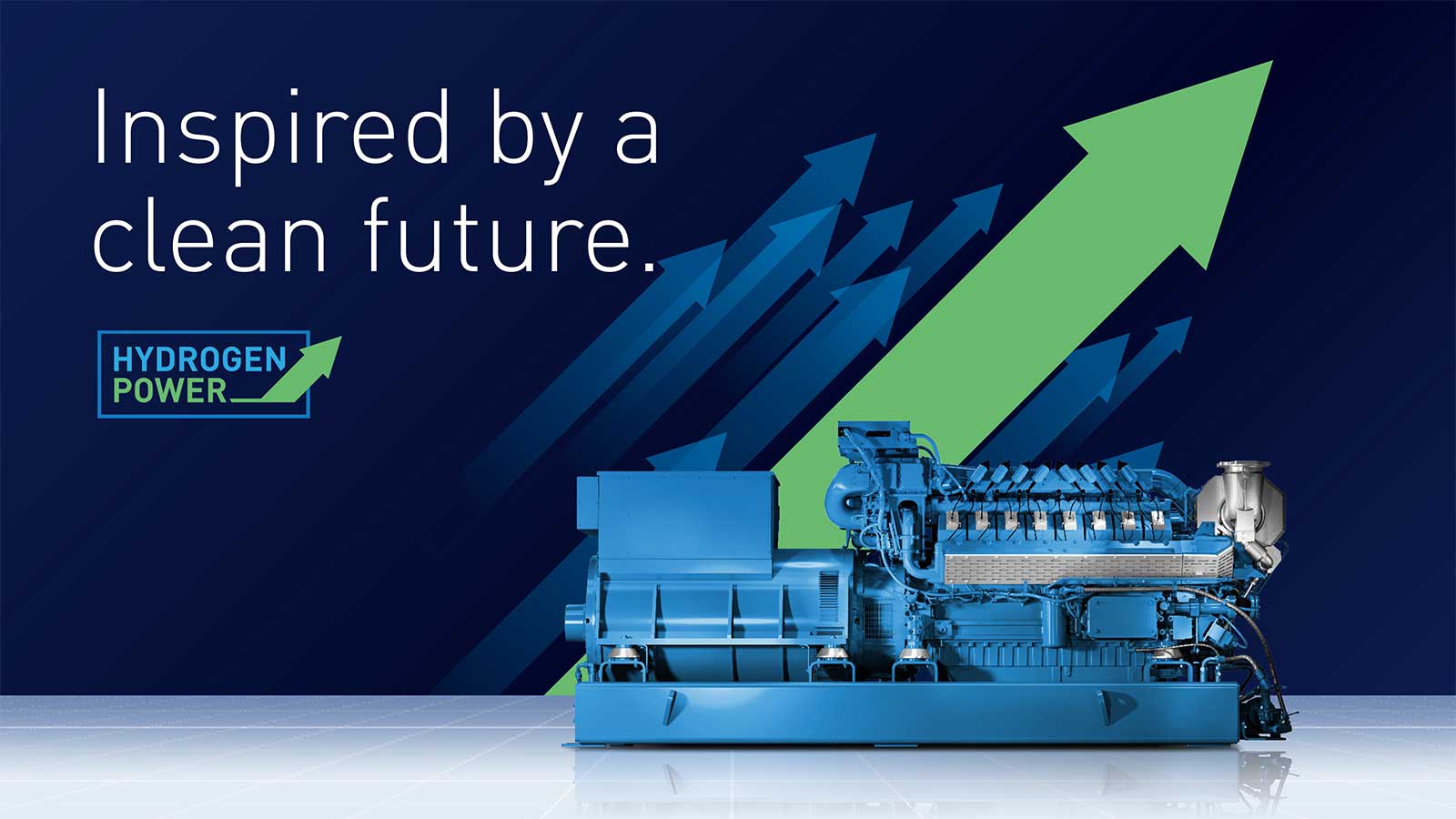
Green Hydrogen as Clean Fuel for MWM Gas Engines and Cogeneration Power Plants
MWM has extensive experience in the use of gas engines with hydrogen admixture. Through the deployment of various MWM products and technologies in customer projects, MWM has implemented trend-setting projects with a hydrogen content of up to 60 percent.
MWM gas engines are already suitable for operation with a hydrogen admixture of up to 10 vol% without any technical modifications. Higher hydrogen admixtures of up to 25 vol% are also possible with MWM gas engines of the TCG 3016 and TCG 3020 series. For this, however, technical modifications are required in order to ensure safety and optimum performance and efficiency of the energy generation.
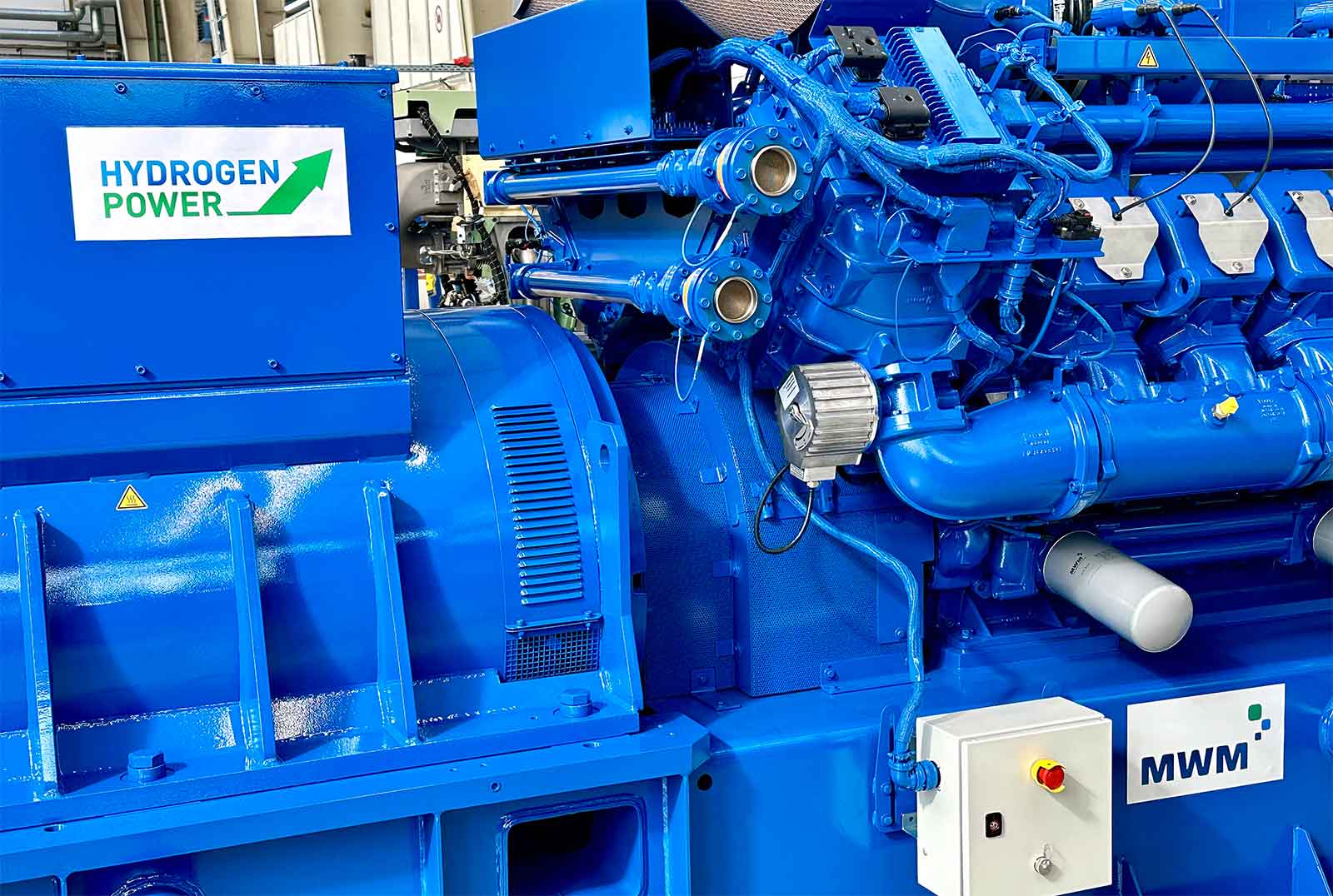
The “Hydrogen Power” signet certifies the operational capability of MWM gas engines with a hydrogen admixture of up to 25 vol%. For existing cogeneration power plants MWM also offers retrofit kits to enable hydrogen admixture. With its range of gas engines that allow an admixture of up to 25% hydrogen by volume, MWM supports plant operators in the gradual switch to more climate-friendly fuels for power and heat production.
Investments in new and replacement cogeneration power plants that enable the use of hydrogen
For customers who want to invest in new engines for continuous operation, base load supply, or peak load operation, MWM will introduce gas engines that can run on natural gas with a hydrogen admixture of up to 25 vol%.
The new TCG 3016 and TCG 3020 gas engines introduced by MWM can be operated with a hydrogen admixture of up to 25 vol%. With its offering, MWM enables plant operators to switch to more climate-friendly fuels while preserving their plants’ long-term economic viability.
MWM retrofit and conversion offering for existing cogeneration power plants
For customers who want to upgrade their plants for the use of hydrogen, MWM offers retrofit kits for the gas engines of the TCG 3016 and TCG 3020 series in order to enable hydrogen admixture of up to 25 vol%. The MWM 25H2-Kit for existing plants with TCG 3016 gas engines is offered in two editions: Depending on their needs, plant operators can convert their gas engines of this series for operation with a hydrogen admixture of up to 20 vol% or up to 25 vol%. With the MWM 25H2-Kit for retrofitting existing plants, plant operators can upgrade their gas engines of the TCG 3020 series for operation with a hydrogen admixture of up to 25 vol%. With this offering, MWM facilitates the transition to plant operation with hydrogen admixture, thereby boosting operational efficiency and reducing emissions.
Brochure MWM 25H2-Kit for TCG 3016
The TCG 3016 series now offers the possibility of natural gas operation with hydrogen admixture of up to 25 vol.% for both 50 Hz and 60 Hz. In addition to new engines, retrofit solutions are available for existing units in the field.
Click this brochure to access the digital publishing platform issuu.com. This website is governed by the issuu Privacy Policy.
All languages on issuu: EN | DE | ES | FR | NL | CN
Download PDF: EN | DE | ES | FR | NL | CN
Brochure MWM 25H2-Kit for TCG 3020
New plants with the TCG 3020 series are now suitable for natural gas operation with a hydrogen admixture of up to 25 vol%, both for 50 Hz and for 60 Hz. Retrofit solutions are available for existing plants.
Click this brochure to access the digital publishing platform issuu.com. This website is governed by the issuu Privacy Policy.
All languages on issuu: DE | EN | CN | ES | FR | NL
Download PDF: DE | EN | CN | ES | FR | NL
Brochure: MWM 25H2-Kit for TCG 2032 and TCG 2032B
The brochure for MWM TCG 2032 gas engines shows the parts and components included in the retrofit 25H2-Kit for a hydrogen admixture of up to 25 vol%.
Click this brochure to access the digital publishing platform issuu.com. This website is governed by the issuu Privacy Policy.
All languages on issuu: DE | EN | CN | ES | FR | NL
Download PDF: DE | EN | CN | ES | FR | NL
Benefits of the Operation of MWM Gas Engines with Hydrogen
- Climate-friendly, future-proof alternative to fossil fuels
- Energy generation with reduced carbon emissions
- Easier compliance with emission limits
- Based on long-standing experience with various technologies
- New engines and retrofit kits for MWM gas engines of the TCG 3016, TCG 3020, and TCG 2032 series available for hydrogen admixture of up to 25 vol%
- Hydrogen admixture of up to 10 vol% already possible without any technical modifications
- Sustainable, profitable operation of your plant with MWM engines and hydrogen
Read More
Alliance Hydrogen Combustion Engine

Caterpillar Energy Solutions and its brand MWM are a member of the “Allianz Wasserstoffmotor e.V.” (Alliance Hydrogen Combustion Engine). As an ambassador, mediator and supporter of the hydrogen combustion engine technology initiative the alliance is committed to future climate-neutral mobility and the generation of sustainable electricity.
(You can use the link below to leave the MWM website and reach the external website of another provider (Allianz Wasserstoffmotor e.V.). The data protection regulations of this provider apply there and cookies may be set by this provider. This is beyond our control.)



































